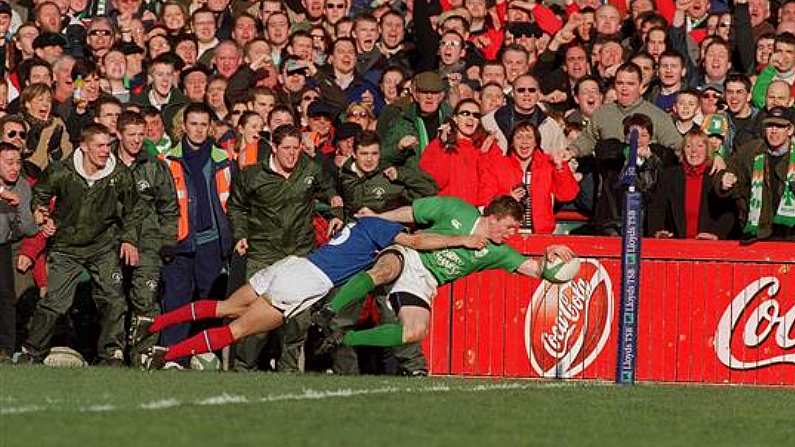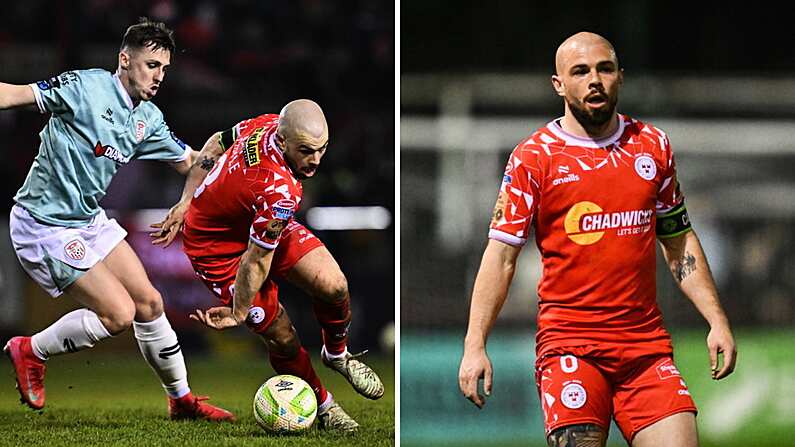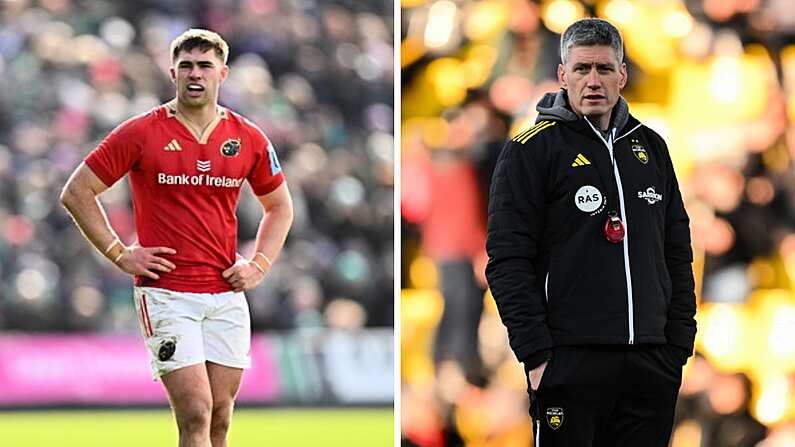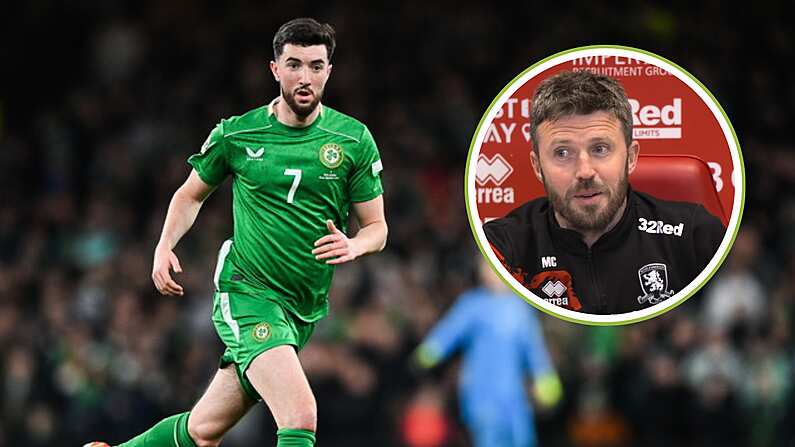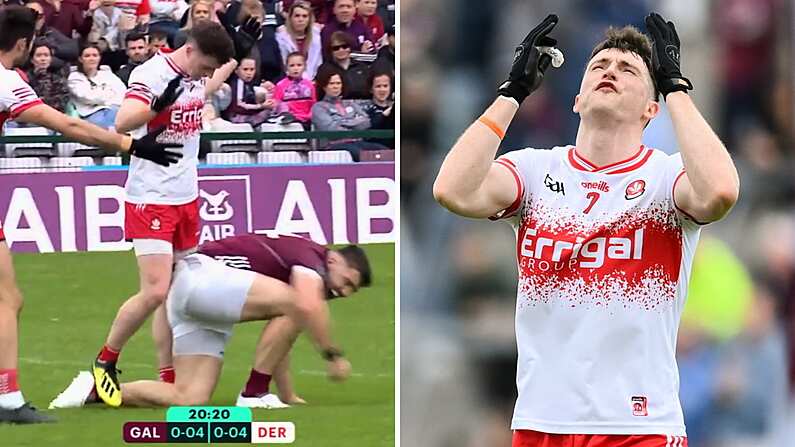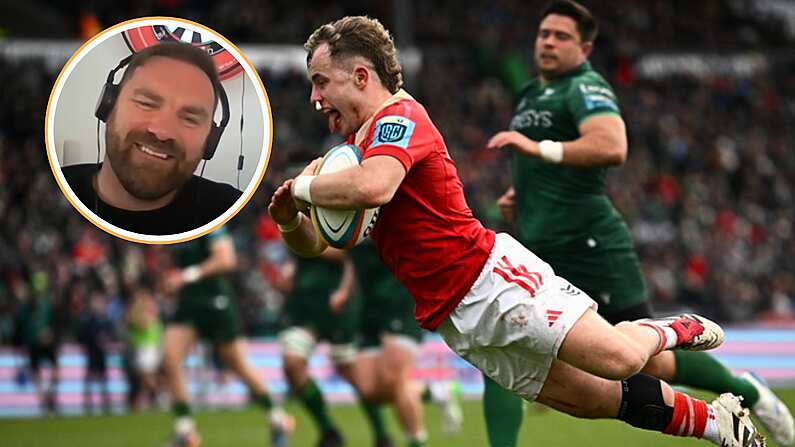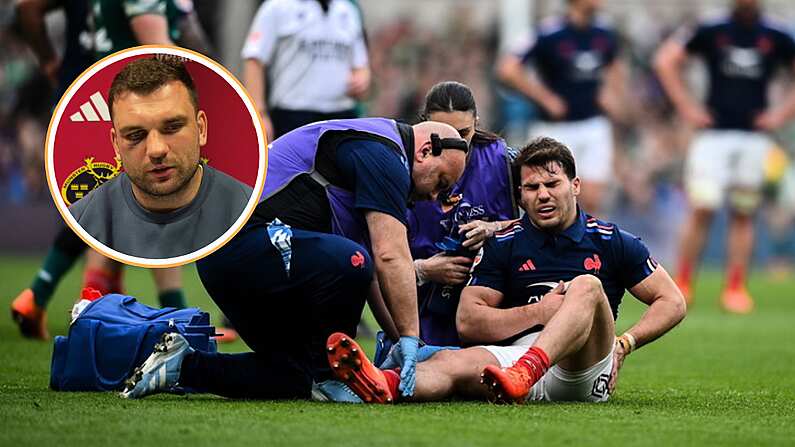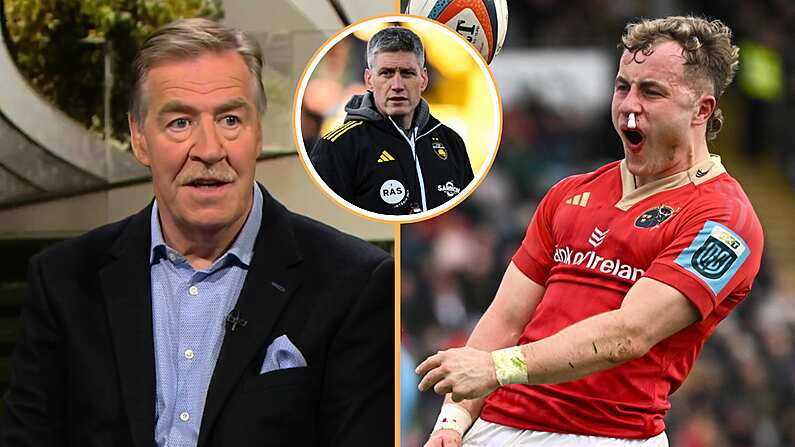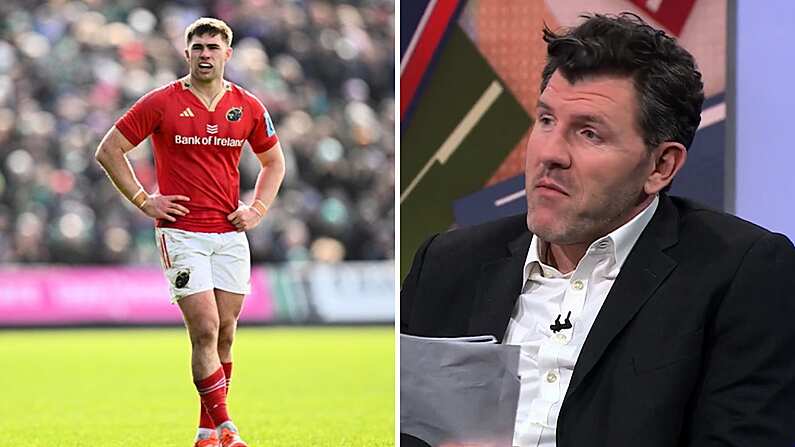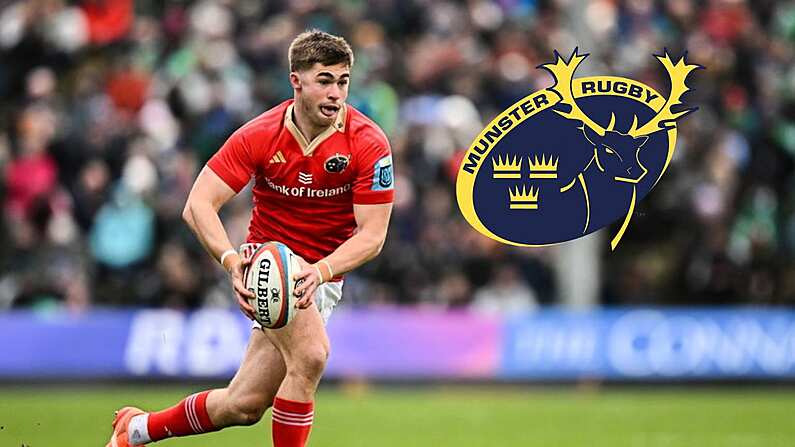With France arriving in town this weekend, it's time to dip into the memory banks and find some memorable moments from the rivalry with the French.
NOTE: We have sought to eschew more obvious tales like the Brian O'Driscoll hat-trick in 2000, Vincent Clerc in Croke Park, and 'Le Drop'. I trust we all recall those.
1982 - FORGET ABOUT THE GRAND SLAM
This match has been tastefully excised from each and every retrospective on Ireland's 1982 Five Nations campaign. Reeling in the Years has no use for it, preferring to leave its nostalgic viewers with the belief that the tournament ended after Ireland beat Scotland and the jubilant supporters invaded the Lansdowne Road pitch.
Between 1974 and 1996, Ireland played 12 Five Nations games at the Parc des Princes and lost all of them. The margin of defeat seemed to increase with every visit. The usually respectable losses of the 1970s would gradually make way for the full blown hammerings of the early 1990s.
Ireland scored a total of two tries across those 12 games, and one of those was a penalty try (still a try!). Winger Freddie McLennan was the only Irishman to score in Paris in this sequence, going over a 4-pointer in the valiant 19-18 loss in 1980.
McLennan wouldn't hang around to be part of the 1982 Triple Crown. A member of the Irish squad that embarked on the controversial tour of South Africa in 1981, both McLennan and scrum half John Robbie opted to remain in the country. Decades later, both still live in South Africa, Robbie making a name as a radio presenter and McLennan working as an architect.
After Denis Hickie ran in an intercept try in the Stade de France in '98, McLennan rang him up.
"This is Freddie... You're some bollocks. Nobody remembers me apart from that try and now nobody is going to remember me ever again."
The ultimate proof of our hoodoo in Paris arrived in 1982 when a Grand Slam chasing Ireland were crushed 22-9 by a France team seeking to avoid the wooden spoon. Serge Blanco and Patrick Mesny ran in tries for France while Ireland's only scoreboard response came via three Ollie Campbell penalties.
Irish popular history has decided to forget this game happened at all. In all the many repeats and documentary footage celebrating the Ollie Campbell-inspired completion of the Triple Crown against Scotland that year, it is never referenced, not even in the off-hand, that Ireland were now just one game away from a Grand Slam. Or that a team who had lost all three of their matches was all that stood in our way.
https://youtu.be/VbbOp31L5NM
No, the impression is generally given that, in those innocent times, everyone was just chuffed to have the Triple Crown in our possession again. [Metaphorically, of course. Rugby didn't do actual trophies in those years (very much unlike now!) and the Five Nations wouldn't until 1993.] And that the Grand Slam, despite being eminently achievable, simply wasn't on the agenda at that time. It wouldn't happen now.
1996 - "IF THERE'S ANYTHING WORSE THAN HAVING SOME FUCKER STICK HIS FINGER IN YOUR EYE, IT'S HAVING HIS BUDDY TRYING TO RIP THE BOLLOCKS OFF YOU AT THE SAME TIME"
A fitting conclusion to the Parc des Princes years for Ireland. They did secure their first seven-pointer in the ground, thanks to referee Ed Morrison's decision to award a penalty try in the final minutes. But this pathetic consolation wasn't enough to prevent Ireland falling to their heaviest defeat in the fixture.
The Sky Sports report began with the line, "It didn't take long for the frailties of the Irish to be exposed at the Parc des Princes as they continued one of the worst sporting records."
45-10 and the French didn't even bother with penalties. They ran in seven tries with their rangy and elegant winger, and father to France's current out-half, Emile N'tamack especially rampant.
However, the post-match inquest was less pre-occupied with the manner of the defeat than with an incident late in the game when the TV cameras zoomed in on Peter Clohessy stamping on the head of French lock Olivier Roumat.
As revealed in Tom English's fantastic book No Borders, the incident had a backstory.
Back in the shamateurism era of the '80s and early '90s, the media tended to fixate on the wizardry of the French backs. Veterans from the period, by contrast, often look past that and instead wince at the memory of the brutality of their forwards.
No one took more abuse than Peter Clohessy. In 1994, he was the target of an abnormal level of scragging and tearing and punching, to the point where it worried the Irish sideline. He was hauled off near the end. The Claw then had to be prevented from returning to the field by Ireland manager Noel 'Noisy' Murphy who screamed "They're going to kill you, they're going to kill you, you're not going back out on that field."
Speaking to English, Clohessy eloquently described the modus operandi of the French pack.
I never liked them. On the field they'd be gouging, punching and catching you by the stones. If there's anything worse than having some fucker sticking his finger in your eye, it's having his buddy trying to rip the bollocks off you at the same time.
As they trooped off the field, Clohessy had almost forgotten the Roumat incident, until Neil Francis, by now a full-blown reporter for the Sunday Tribune, told him that the footage had been replayed over and over on TV.
The match was over and no one took any notice of it as we were coming off the field. It was actually Neil Francis who was reporting on the match, who said it to me. 'I think you're in a bit of trouble.' I said, 'Why, what happened? I had forgotten about it. He explained that it had been replayed all the time on TV. I kind of leaned on his head with my boot. I actually pulled out of it when I was doing it as I realised I was doing it.
The incident was replayed ad nauseum over the following the days. The media shrieked with outrage, mothers shielded their children's eyes.
Clohessy was lashed with a 26 week playing ban. It was due to run out in November 1996 but in the meantime, Clohessy signed a deal to John Connolly's Queensland Reds. In early 1997, he became the first prominent Irish born player to compete in Super Rugby down under. Read about that experience here.
2001 - "HAVE YOU ANY MILK OR MEAT ON YOU?"
Andrew Maxwell used to tell a joke about Ireland's emergency response to the threat of 'Foot and Mouth disease'.
At the height of the crisis, he arrived into Knock airport - the puniness of which he exaggerated for the benefit of UK audiences - and a customs official piped up "have you got any milk or meat on you?"
"No," Maxwell replied, "but I've a whole pile of smack."
The customs official paused for a second. "Has the smack been on a farm?"
There were no UK based rugby teams allowed into the country either. Ireland were scheduled to travel to Murrayfield and Cardiff but Minister for Agriculture Joe Walsh wasn't prepared to risk the Irish players and supporters bringing the stench of foot and mouth disease back with them. Likewise, the England rugby and their often rural supporters would have to stay away from Lansdowne Road for a while.
It's fair to say the Irish government took a much more radical approach to preserving the health of livestock than humans when it came to curbing overseas travel two decades later.
The home win over France - our first in 18 years - was the last game Ireland would play for seven months. All the matches not involving Ireland were run off that spring.
For a time, it was thought likely that our campaign would simply be abandoned, a la 1972. But the Scotland, Wales and England games were re-scheduled for the autumn.
Ireland's win over France should have been more handsome than it was and is solely remembered now due to Brian O'Driscoll's controversial try, which the TMO adjudged a score, much to Jeremy Guscott's consternation.
The score put Ireland 19-3 ahead. They proceeded to concede two tries, one of which was converted. It created an unnecessarily frantic endgame. But the back-to-back wins over the French were achieved.
2009 - ON THE ROAD
After the 2008 November series, George Hook had been in apocalyptic mood even by his own extraordinary standards. Ireland, he reckoned, were potentially vulnerable against every other side in the championship, even the Scots and the Italians.
It was in November, at a meeting in Enfield, when Rob Kearney stood up and alleged that the Munster players relished togging out for their province more so than for their country.
It was a widely held belief in some circles but it was startling to learn that such an intemperate and loaded remark had been made at a team meeting, especially by a player as new to the setup as Kearney.
A brave moment, popular history records this, no doubt melodramatically, as the moment Ireland were set on the road to the Grand Slam.
The 30-21 win over France in the opening match of the Six Nations represented possibly Ireland's most impressive performance of the campaign. Jamie Heaslip, Brian O'Driscoll and Gordon D'Arcy grabbed the tries.
Notwithstanding, Ireland's still poorish record with the French, O'Driscoll retained a hot streak against les blues.
In RTE's Sigur Ros soaked, pre-Christmas celebration of the 2009 Grand Slam, the players chewed Ryle Nugent's ear off when he suggested that the France win teed up the Grand Slam.
No, they said, in an angry, uber-professional tone. It was just Game 1 down, nothing more.
But it was reasonable for supporters to dream. In the Eddie O'Sullivan era, it was the French who consistently who foiled Ireland's Grand Slam ambitions. In 2004, 2006, and 2007, Ireland won three Triple Crowns and no championship. And it wasn't as if they were losing to Italy.
After the game, the younger players savoured the victory over France. They were stopped in their tracks when Paul O'Connell remarked that it was his first ever win over the French.
2011 - "HE'S DROPPED IT!"
After Jamie Heaslip barrelled over the line for Ireland's 3rd try and as Ronan O'Gara composed himself before the touchline conversion, BBC co-commentator Brian Moore addressed one of the curious aspects of this game.
"Well, whatever turns out to be the result of this game, I'm tempted to say that it was all the result of the Irish. Because, good or bad, they have been responsible for everything that's happened."
Despite a blitzkrieg of an opening and a barnstorming finish, Ireland somehow contrived to lose to a French team who offered precious little in the form of creativity or ambition.
Ireland's final try, the one which teed up the dramatic finish, arose from fortuitous ricochet after a blocked grubber kick. But Moore observed that Ireland deserved the good fortune as they had done "everything positive in this game."
Ireland won the try count by 3-1 but were destroyed on the penalty count. It was a recurring theme throughout the 2011 season.
Fergus McFadden and Tomás O'Leary scored 1st half tries but the French remained in touch thanks to Dave Pearson's whistle. Parra clipped over the penalties with efficiency. In the 3rd quarter, Gordon D'Arcy was bundled over by Aurelian Rougerie who laid on a try from Maxime Medard. Despite making all the running, Ireland were now 22-15 down.
Declan Kidney was bitterly annoyed by Pearson's stewardship of the game, and later secured a clarification from the IRB on a couple of points. He revealed that one penalty had been wrongly awarded against Ireland and that France ought to have penalised during two plays when penalties were ultimately awarded against Ireland.
It was no consolation whatsoever. The game ended in chaotic and dramatic fashion after Medard made a mess of collecting a Keith Earls kick and Jamie Heaslip dived on the ball. Instead of shifting the ball wide, Sean Cronin attempted to power over the line. He dropped the ball in the tackle and game was gone.
2014 - FAREWELL TO THE GREATEST
Ireland beat France in Paris to secure the Six Nations Championship in 2014. It was also Brian O'Driscoll's last game for Irleand. We all remember that.
What you forget are the details.
Like the fact it was one of the most emotionally exhausting games we've ever seen. And not just for the players. Watching the game was an absolute battle of endurance.
Ireland hadn't beaten France since the Grand Slam in 2009 at Croke Park. The last two games between the two teams had been a draw. Ireland just needed a win of any kind to win the Championship on points difference. Any less and it went to England.
You might remember that Johnny Sexton scored two tries and scored 17 points. You forget he missed a couple of makeable kicks and went off injured with over 10 minutes to go, meaning the game was in the hands of a very inexperienced Ian Madigan for the crucial final minutes.
You forget that Steve Walsh gave a try to France instead of going to the TMO after a clear knock-on, meaning they were back in it, two points behind, and Ireland were just a kick of the ball away from defeat.
You remember that France had a late try disallowed for a forward pass. You forget that the decision from the TMO took forever, and we had convinced ourselves we were going to be robbed of the victory.
You remember it was O'Driscoll's last game, but you forget he was also man of the match for the second week in a row.
He got emotional in his interview with RTE after the game. You remember he had made his name in Paris 14 years before, but you forget he hadn't won there again until his last game for Ireland. You forget that Ireland had one in Paris once since 1972, and before that, since 1952.
You remember that Ireland had won a Grand Slam five years before, but you forget this was O'Driscoll and Ireland's second Championship win since 1985. Ireland didn't win Championships and they didn't win in Paris. This was a big, big deal.


